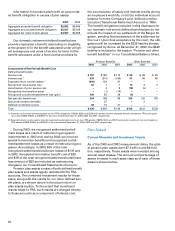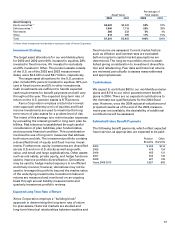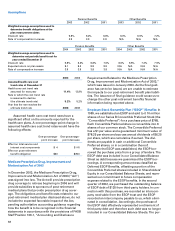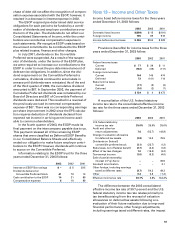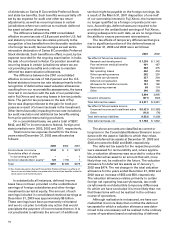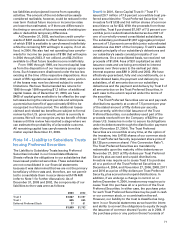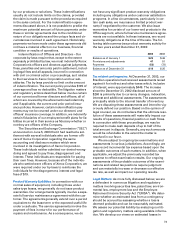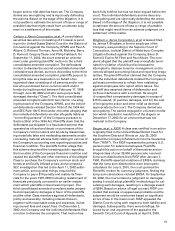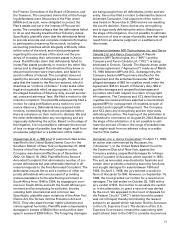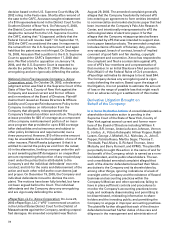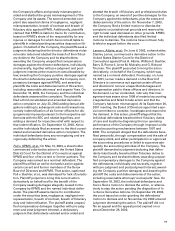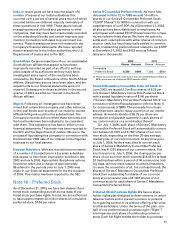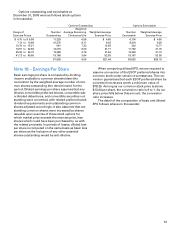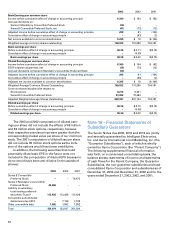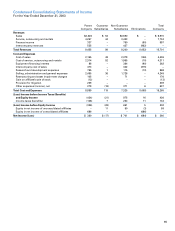Xerox 2003 Annual Report Download - page 77
Download and view the complete annual report
Please find page 77 of the 2003 Xerox annual report below. You can navigate through the pages in the report by either clicking on the pages listed below, or by using the keyword search tool below to find specific information within the annual report.
75
begun and no trial date has been set. The Company
denies any wrongdoing and is vigorously defending
the actions. Based on the stage of the litigation, it is
not possible to estimate the amount of loss or range of
possible loss that might result from an adverse judg-
ment or a settlement of this matter.
Carlson v. Xerox Corporation, et al.: A consolidated
securities law action (consisting of 21 cases) is pend-
ing in the United States District Court for the District of
Connecticut against the Company, KPMG and Paul A.
Allaire, G. Richard Thoman, Anne M. Mulcahy, Barry
D. Romeril, Gregory Tayler and Philip Fishbach. On
September 11, 2002, the court entered an endorse-
ment order granting plaintiffs’ motion to file a third
consolidated amended complaint. The defendants’
motion to dismiss the second consolidated amended
complaint was denied, as moot. According to the third
consolidated amended complaint, plaintiffs purport to
bring this case as a class action on behalf of an
expanded class consisting of all persons and/or enti-
ties who purchased Xerox common stock and/or
bonds during the period between February 17, 1998
through June 28, 2002 and who were purportedly
damaged thereby (“Class”). The third consolidated
amended complaint sets forth two claims: one alleg-
ing that each of the Company, KPMG, and the individ-
ual defendants violated Section 10(b) of the 1934 Act
and SEC Rule 10b-5 thereunder; the other alleging that
the individual defendants are also allegedly liable as
“controlling persons” of the Company pursuant to
Section 20(a) of the 1934 Act. Plaintiffs claim that the
defendants participated in a fraudulent scheme that
operated as a fraud and deceit on purchasers of the
Company’s common stock and bonds by disseminat-
ing materially false and misleading statements and/or
concealing material adverse facts relating to various of
the Company’s accounting and reporting practices and
financial condition. The plaintiffs further allege that
this scheme deceived the investing public regarding
the true state of the Company’s financial condition and
caused the plaintiffs and other members of the alleged
Class to purchase the Company’s common stock and
bonds at artificially inflated prices, and prompted a
SEC investigation that led to the April 11, 2002 settle-
ment which, among other things, required the
Company to pay a $10 penalty and restate its finan-
cials for the years 1997-2000 (including restatement of
financials previously corrected in an earlier restate-
ment which plaintiffs contend was improper). The
third consolidated amended complaint seeks unspeci-
fied compensatory damages in favor of the plaintiffs
and the other Class members against all defendants,
jointly and severally, including interest thereon,
together with reasonable costs and expenses, includ-
ing counsel fees and expert fees. On December 2,
2002, the Company and the individual defendants filed
a motion to dismiss the complaint. That motion has
been fully briefed, but has not been argued before the
court. The individual defendants and we deny any
wrongdoing and are vigorously defending the action.
Based on the stage of the litigation, it is not possible
to estimate the amount of loss or range of possible
loss that might result from an adverse judgment or a
settlement of this matter.
Bingham v. Xerox Corporation, et al: A lawsuit filed
by James F. Bingham, a former employee of the
Company, was pending in the Superior Court of
Connecticut, Judicial District of Waterbury (Complex
Litigation Docket) against the Company, Barry D.
Romeril, Eunice M. Filter and Paul Allaire. The com-
plaint alleged that the plaintiff was wrongfully termi-
nated in violation of public policy because he
attempted to disclose to senior management and to
remedy alleged accounting fraud and reporting irregu-
larities. The plaintiff further claimed that the Company
and the individual defendants violated the Company’s
policies/commitments to refrain from retaliating
against employees who report ethics issues. The
plaintiff also asserted claims of defamation and
tortious interference with a contract. He sought:
(i) unspecified compensatory damages in excess of
$15 thousand, (ii) punitive damages, and (iii) the cost
of bringing the action and other relief as deemed
appropriate by the court. The Company denied any
wrongdoing. The parties engaged in voluntary media-
tion which resulted in resolution of the dispute on
December 17, 2003 for an amount that was not
material to the Company.
Berger, et al. v. RIGP: A class was certified in an action
originally filed in the United States District Court for
the Southern District of Illinois on July 25, 2000
against the Company’s Retirement Income Guarantee
Plan (“RIGP”). The RIGP represents the primary U.S.
pension plan for salaried employees. Plaintiffs
brought this action on behalf of themselves and an
alleged class of over 25,000 persons who received
lump sum distributions from RIGP after January 1,
1990. Plaintiffs asserted violations of ERISA, claiming
that the lump sum distributions were improperly
calculated. On July 3, 2001, the court granted the
Plaintiffs’ motion for summary judgment, finding the
lump sum calculations violated ERISA. On September
30, 2002, the court entered a judgment on damages,
stating it would adopt plaintiffs’ methodology for cal-
culating such damages, resulting in a damage award
of $284. Based on advice of legal counsel, RIGP con-
cluded that success on appeal was probable and the
judgment would be overturned based on significant
errors of law in the lower court. RIGP appealed the
District Court’s ruling with respect to both liability and
damages. Subsequently, there were briefings, fol-
lowed by an oral argument of the appeal to the
Seventh Circuit Court of Appeals on April 9, 2003.



